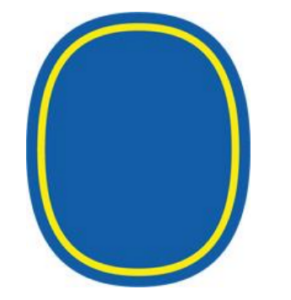Brussels – The Court of Justice of the EU confirmed that the trademark filed in the EU by Chiquita Brands does not qualify for protection as a Union trademark for fresh fruit.
We are not talking about the trademark with the addition of the well-known female figure printed on it or the company name, but the blue and yellow oval underneath. The U.S. company’s symbol had been registered with the European Union Office for Intellectual Property (EUIPO) for several foods, including fresh fruit.
 The litigation arose in 2020 from the request of a French company, Compagnie financière de participation, to declare the nullity of that trademark, which had no “distinctive character”.
The litigation arose in 2020 from the request of a French company, Compagnie financière de participation, to declare the nullity of that trademark, which had no “distinctive character”.
EUIPO had agreed with the French company and, in May 2023, ruled that the trademark was invalid for fresh fruit, including the well-known bananas. The reason was the same as the Compagnie had proposed: Chiquita Brands’ trademark had no special characteristics.
In addition, the European Intellectual Property Office had placed the responsibility on Chiquita Brands to prove that the trademarked symbol had acquired “distinctive character as a result of use.” Having failed to do so, the company located in Florida had not lost heart, proceeding to an appeal in order to have the nullity of the Chiquita-branded blue and yellow oval revoked.
European justice has not changed its mind. The Court reaffirmed that“neither the shape nor the blue and yellow colour scheme of the mark gives it a distinctive character.” The Court found that the shape does not have distinctive characteristics. For the shape, the Court ruled that the shape resembling an oval does not have distinctive characteristics and, in addition, that round labels are often used in the banana industry (since they fit well with the shape of the fruit).
Even the colour combination had nothing original about it, being a combination of primary hues and often used in the fresh fruit trade. The consequence of these two elements is that the originally filed symbol did not possess anything distinctive that would have made it possible to “identify the commercial origin” of the fruit sold by Chiquita Brands.
Nor was there any evidence that the company’s symbol had become so established in the EU as to justify the request to annul the EUIPO decision. The evidence was circumstantial to four countries, and it could not be inferred that the situation was the same in the remaining 23 countries. The key takeaway from the argument was that brand identification depended only on the use of “additional figurative or denominative elements, in particular, the word ‘Chiquita'”.
No good news for Chiquita Brands. The U.S. company will have to agree with the CJEU and EUIPO that the blue and yellow oval, with no additional elements, does not immediately recall the products sold and, after the second decision, accept that the trademark is not protected in the EU.
English version by the Translation Service of Withub





![Torino, piazza Castello [foto: Emanuele Bonini]](https://www.eunews.it/wp-content/uploads/2024/11/piazza-castello-75x75.jpeg)


![Una donna controlla le informazioni sul cibo specificate sulla confezione [foto: archivio]](https://www.eunews.it/wp-content/uploads/2014/12/Etichette-alimentari.jpg)

